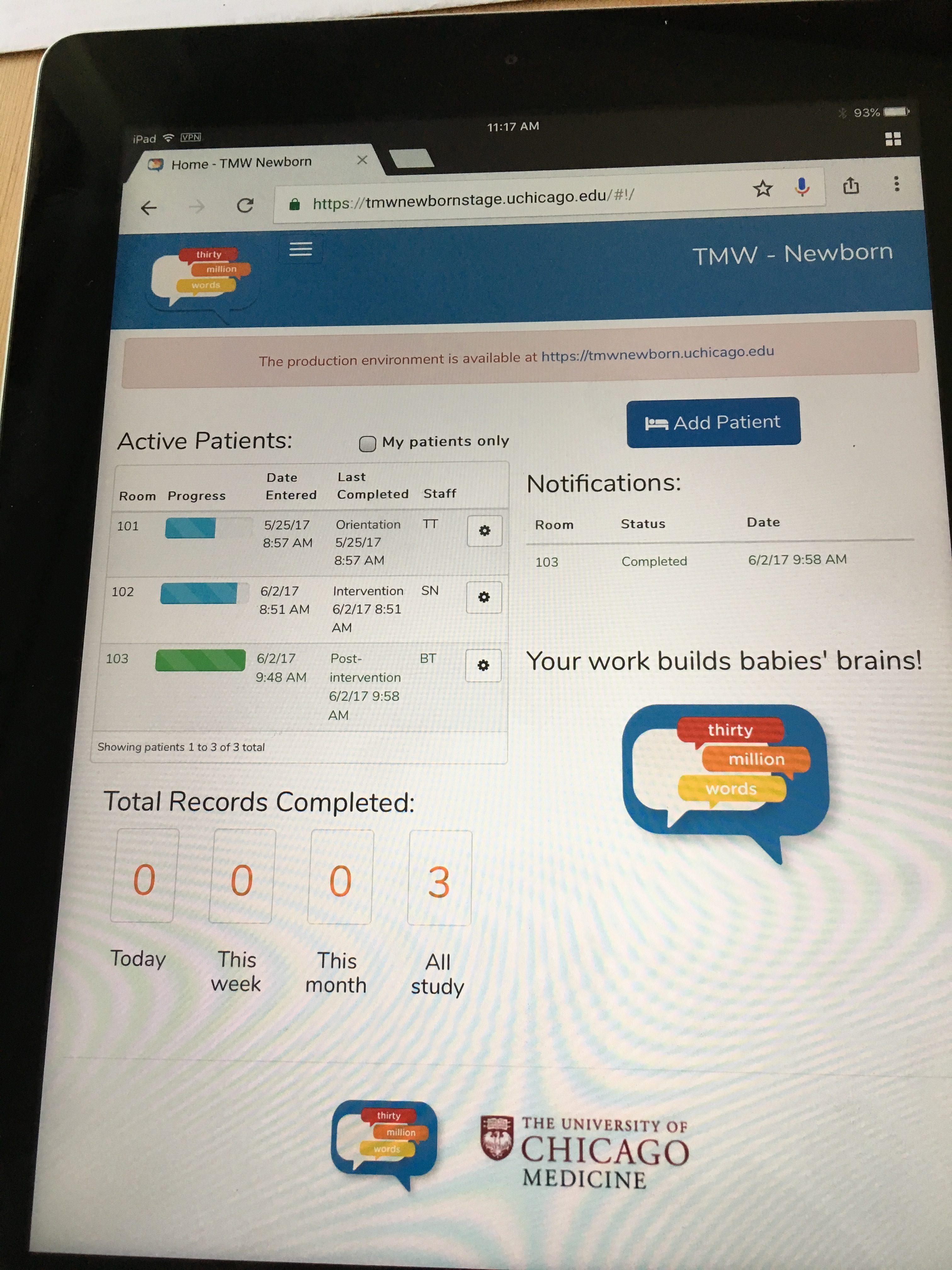Pensacola moms join University of Chicago research project
- April 24, 2018
- / Shannon Nickinson
- / early-learning

Escambia County mothers are now part of the leading edge of building an Early Learning City.
Moms at two of Escambia County’s three main birthing hospitals are now part of the University of Chicago’s research project on teaching parents about the power of their voices to build a baby’s brain.
TMW Newborn, the research project developed by the Thirty Million Words Initiative founded by Dr. Dana Suskind, was brought to Pensacola through the Chicago university’s partnership with the Studer Community Institute, first announced in 2016.
TMW Newborn, is a video developed by the Thirty Million Words Initiative at the University. It uses a video lesson given on an iPad to get parents talking and interacting with their babies from day one.
Baptist Hospital joined the research project in mid-March; West Florida Hospital joined the pool in mid-April. Sacred Heart Hospital is anticipated to join the research project later this year.
Baptist Healthcare President and CEO Mark Faulkner said his health system is excited to partner with the University of Chicago and SCI in this important research.
“Theirs is compelling evidence that a child's early brain development can be positively impacted through purposeful interventions and we want to do our part in furthering that research," Faulkner said.
Carlton Ulmer, President and CEO of West Florida Healthcare, said “it is an honor for West Florida Healthcare to participate in the Thirty Million Words Initiative by providing training and Brain Bags to new mothers in our hospital.
“The long-term impacts of this initiative will be important to the success of our community and continuing to grow into one of the best places to live, work and play in the nation,” Ulmer said.
The Newborn Intervention is a video and a survey. The video has been produced in 9-minute and 14-minute versions, in Spanish and English. The content is the same, but the 9-minute version has some more edits to condense the teaching time. There are also versions with questions that mom must answer during the video to make it continue.
It went to trial with about 500 families in Chicago through two hospitals — Northwestern University and University of Chicago. It aims to impact parents knowledge and beliefs about the role they can have in healthy early brain development.
Ashley Telman is the manager of professional development and curriculum at TMW.
“Newborn is our widest reaching intervention,” Telman says. “Any parent of a newborn can participate and learn from it. It’s really promising and exciting to know that as the curriculum evolves, we see new parents across the spectrum all improve their knowledge around child development and interaction.”
There are 18 questions in the survey about how children learn and develop. Post video, parents are asked to answer the same 18 questions. In the pilot study:
— 99 percent of moms found the video helpful.
— 98 percent of moms learned something new.
— 97 percent of moms said they would use the strategies they learned at home.
— Six weeks later, 75 percent of moms retained the knowledge they learned from the video.
Bringing this piece of research is an important next step in Pensacola’s journey to becoming an Early Learning City. What our parents experience with Newborn will be used by researchers to refine the teaching to help moms in the future get the most learning out of the video.
Suskind’s team based TMW on a 1995 study by two Kansas researchers Betty Hart and Todd Risley, who found some children hear 30 million more words by their fourth birthday than others. The children who heard 30 million more words were more likely to be ready to learn at the start of preschool, and by the third grade, they had bigger vocabularies, were stronger readers and scored higher on cognitive tests.
A key takeaway of the study, said Suskind, is that children who started school ahead tended to stay ahead, and children who started school behind tended to stay behind.
With about 3,000 children beginning kindergarten each school year in Escambia County, the data indicates that about 1,000 5-year-olds show up to school lagging behind their peers in language skills they'll need to learn to read and succeed in school.
“That’s why early learning is so important,” she said when the SCI partnership was announced in 2016. “TMW is designed to confront not only the language gap, but also the achievement gap. We’re so excited to have Pensacola as our first community outside of Chicago to pilot our program.”
“Pensacola will be our first test case,” said John List, who has been working with Suskind and TMW and is chairman of the University of Chicago’s economics department. “Once we learn what works in Pensacola, we will then take that to a nationwide experiment. We will choose communities in an experimental way and roll out in these communities what we did in Pensacola that worked and see if it can work nationwide. And I believe it will.”
 CivicCon launches with a look at good growth in cities
CivicCon launches with a look at good growth in cities
 Building stronger brains one baby, one parent at a time
Building stronger brains one baby, one parent at a time
 SCI debuts commercial on Early Learning City
SCI debuts commercial on Early Learning City
 Entrecon: World class speakers and an opportunity to sharpen skills
Entrecon: World class speakers and an opportunity to sharpen skills
 PYP Quality of Life survey 2017
PYP Quality of Life survey 2017
 EntreCon Pensacola 2016: A look back
EntreCon Pensacola 2016: A look back
 Leadership tip: getting better employee takeaways
Leadership tip: getting better employee takeaways
 Leadership tip: be interested instead of interesting
Leadership tip: be interested instead of interesting
 Leadership tip: delivering difficult messages
Leadership tip: delivering difficult messages
 Brain Bags boost Arc, Early Childhood Court programs
Brain Bags boost Arc, Early Childhood Court programs